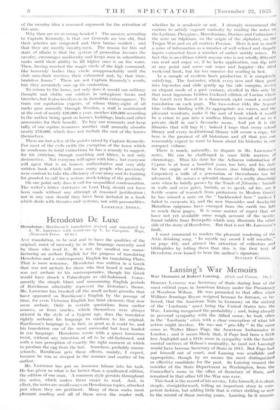Herodotus De Luxe
Herodotus : Rawlinson's translation revised and annotated by A. W. Lawrence with woodcuts by V. Lo Campion. Maps. (Nonesuch Press. £6 OS.) ANY translation, to be real and to have the qualities of the Original, must of necessity be in the language currently used by those who read it. It is not the smallest use manu- facturing an archaic English for the , purpose of translating Herodotus and a contemporary English for translating Plato. That is mere nonsense. Herodotus was written in a Greek that was not archaic for those who first heard it and Plato was not archaic to his contemporaries, though his Greek ,would have struck a Palaeologue as old-fashioned. Corse. quently the simple- blunt and unassuming English periods of Rawlinson admirably represent the historian's theme. Mr. Lawrence has brushed off the small archaic growths that have appeared on Rawlinson's English by the passage of time, for even Victorian English has faint elements that now seem archaic. Only in certain quotations from earlier sources, or from oracles, which themselves were always uttered in the style of a bygone .age, does the translator rightly archaize his language to conform to his original. Rawlinson's language is, in fact, as good as it could be, and his translation One of the most successful but least lauded hi our language. Herodotus wrote with a queer humorous twist, without any intention at all to be old-fashioned, and with a rare perception of exactly the right moment at which to produce the egg from the hat. Somehow, probably uncon- sciously, Rawlinson gets these effects, mainly, I expect, because he was so steeped in the manner and matter of his author.
Mr. Lawrence has put an immense labour into his task. He has given us what is far better than a syndicated edition, the edition of one man. A common style persists throughout the notes, which makes them easier to read. And, in effect, the notes are small essays on Herodotean topics, attached just where they are pertinent. Many of them make most pleasant reading -and - all of them serve the._ reader well, whether he is academic or not. I strongly recommend
curious to satisfy vagrant curiosity by reading- the notes 011 the Lydians, Phrygians, Macedonians, Dorians and Cadmeians ; the note on Silphium, on the origin of the alphabet, on the Trojan War and on all matters Persian. Here is not so :malt a mine of information as a number of well refined and shunt-1Y ingots extracted from a nuMber of rather untidy mines. la fact this is an edition which anyone who is not wholly illiterate can read and enjoy or, if he lacks application, can dip into at any point and come out wiser and happier—the ideal week-end book, but far too massive for reading in bed. As a sample of modern book production it is compleftly satisfying. The footnotes, which every now and then l..;•rtekr. into hip-notes and slide gently up the side margins, re% ive an elegant mode of a past century, rivalled in this only by' that most ingenious 'Golden Cockerel edition of .Lucian where the Greek text flowed in a framework right round a cent rai translation on each page. The two-colour title, the Aegean blue vellum binding with its appropriate sea waves, and the' pleasant woodcuts, make it the sort of book which it votlid be a crime to put into a soulless library instead of on to private shelf in one's favourite room. And yet it is the libraries that will buy it : indeed I hope that every school library and every institutional library will secure a copy, for. here is the greatest of all historians and all that you can reasonably expect to want to know about his histories in out compact volume.
There is much; naturally, to dispute in Mr. Lawrence notes. He can he challenged in some little matters of chronology. Thus his date for the Achaean eolonisation. of Cyprus is at least a hundred years too late, .and his.. date for the origin of writing in Greece (too blindly following Carpenter) a trifle of a generation or thereabouts too fitr advanced. He misses a splendid chance of a really absorbing note when Ile briefly passes liy the Tomb of :.■'itocris : burials in walls and over gates, burials, so to speak, ad hoc, are, fertile source of research from prehistoric to Moslem times ; he has missed a note on the " backbended bow" (unless failed to excavate it), and the new Simonides and Aesehyluf Marathon epigrams have. emerged from the earth too late to reach these pages. It is some matter of regret that we have not yet available sonic rough account of the ifewly-t found tablets from Persepolis which may illustrate the other side of the story of Herodotus. But that is not Mr. Lawrence's
fault, .
I must commend to readers the pleasant rendering of the Attic drinking song, " In myrtle my sword I will wreathe," on page 452, and attract the attention of collectors and bibliophiles by telling them that this is the first text of Herodotus ever issued to bear the author's signature.
STANLEY CASSON..






























































































 Previous page
Previous page